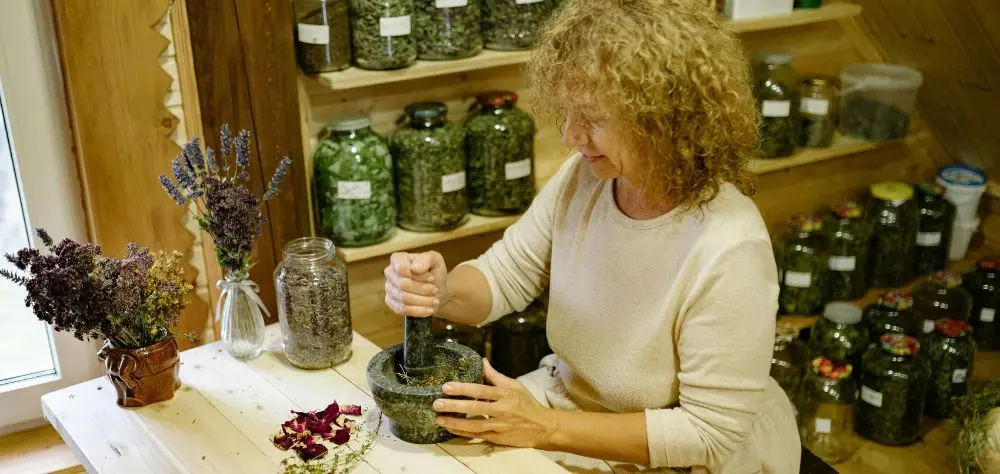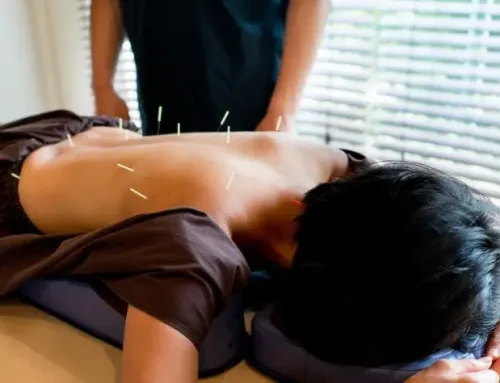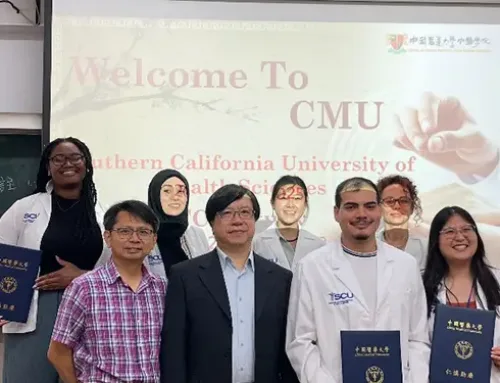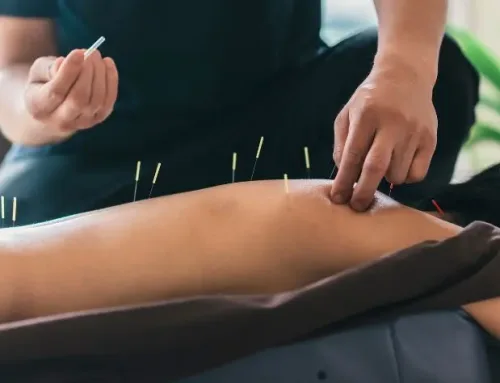How to Become an Herbalist: Doctor of Acupuncture and Chinese Herbal Medicine Program

If you’ve ever wondered how to become an herbalist—the kind who blends ancient wisdom with clinical training and whole-person care—there’s a clear path forward. Herbalists today do more than recommend teas or tinctures. They study diagnostic frameworks, understand the body’s internal patterns, and guide patients using time-tested plant-based therapies. Many work in integrative care settings or operate their own wellness practices.
For those drawn to East Asian medicine, Chinese herbalism offers one of the most structured and respected routes into clinical herbal practice. With the right education, it’s possible to gain deep botanical knowledge, master treatment planning, and work directly with patients.
The Education Behind the Practice: How Herbalists Build Their Expertise
If you’re wondering how to become an herbalist, it starts with understanding that herbalism is both an ancient healing tradition and a modern professional field. Many herbalists begin with curiosity—exploring books, growing herbs, and experimenting with teas or tinctures. That spark often leads to deeper questions about healing, balance, and how to bring this knowledge to others. From self-guided study to doctoral degrees, there are a range of educational options to match your goals.
Each path comes with a different level of responsibility, scope of practice, and depth of training. Whether you’re looking to support your community with herbal wellness tips or want to become a licensed clinical herbalist, it’s helpful to understand what each route offers.
Community Herbalism and Self-Guided Learning
This is where many people start. Self-study includes reading herbal medicine texts, joining online forums, and attending local herb walks or workshops. Community herbalists may offer classes, make custom blends, or support clients in non-clinical settings. While deeply rooted in tradition, this path usually does not involve formal licensure or clinical authority.
Key traits of this path:
- Flexible, informal education
- Non-clinical, community-centered work
- No recognized license or insurance eligibility
Certificate Programs: Foundational and Focused
For those ready to go beyond self-study, certificate programs offer more structure. Often lasting a few months to a year, these programs teach herbal energetics, formulation, plant identification, and preparation techniques. Some offer a cultural or regional focus (e.g., Western, Ayurvedic, or Chinese herbal traditions) and may be online or in-person.
These programs can be excellent for:
- Building confidence and core knowledge
- Supporting family, friends, or wellness clients
- Supplementing careers in massage therapy, coaching, or nutrition
However, they don’t typically prepare students for clinical environments or state-recognized licensure.
Doctoral-Level Training: For Clinical Practice and Licensing
If you’re serious about providing herbal care in clinical or integrative settings, a doctoral-level education is often essential. Programs like the Doctor of Acupuncture and Chinese Herbal Medicine (DAcCHM) are designed for those who want to diagnose, treat, and prescribe herbal medicine with the support of clinical training, scientific knowledge, and a legal scope of practice.
At this level, your education includes:
- Extensive clinical rotations with real patients
- Deep study of herbal pharmacology, pathology, and differential diagnosis
- Integration with other therapeutic modalities such as acupuncture or functional medicine
This path also opens opportunities to work in private practice, community clinics, hospital-affiliated settings, or multidisciplinary wellness centers. If your goal is to make herbal medicine your career—and serve patients in a meaningful, ethical, and safe way—this is the pathway that makes it possible.
Can You Be a Licensed Herbalist? Here’s How It Works
Becoming a skilled herbalist starts with education—but if you want to practice in clinical settings or provide herbal prescriptions legally, licensure is key. Herbalism itself isn’t currently regulated in most U.S. states. That means there’s no universal license that applies solely to Western or folk herbalists. However, there is a respected and clear licensing pathway through Traditional Chinese Medicine (TCM) and acupuncture.
The Path to Legal Practice Through TCM
Licensure as an acupuncturist creates the professional gateway to practice herbal medicine in a regulated, clinical capacity. Most licensed herbalists in the U.S. are also licensed acupuncturists, and for good reason: it’s the most widely recognized legal route.
Key credentials include:
- NCCAOM Certification in Chinese Herbology or Oriental Medicine
- California Acupuncture Licensing Examination (CALE) if you plan to practice in California
These certifications demonstrate that you’ve completed a nationally or state-approved education program, passed rigorous board exams, and are prepared to safely prescribe and manage herbal treatment plans for a range of health conditions.
What Licensure Unlocks for Herbalists
With licensure, you’re eligible to open a clinical practice, bill insurance in some states, and treat patients with an integrated approach to care. It also builds professional credibility—within healthcare teams and with the people who trust you for treatment.
If your goal is to work in integrative medicine, open a wellness clinic, or become a primary herbal care provider, licensure supports all of those possibilities. And in states like California, where TCM is well-established, licensed herbalists are in growing demand across wellness centers, rehabilitation clinics, and interdisciplinary health practices.
Core Skills and Knowledge for Clinical Herbalists
Clinical herbalists bridge traditional wisdom with science-based care. Whether working independently or alongside integrative medical teams, they rely on a precise toolkit of knowledge and practical skills. This foundation helps ensure herbal remedies are applied safely and effectively—and tailored to the unique needs of each patient.
At the heart of this training is deep botanical knowledge. Herbalists must understand plant chemistry, how to identify medicinal species, and how to formulate remedies that align with both Traditional Chinese Medicine (TCM) diagnostics and modern health considerations.
To practice herbal medicine at a clinical level, students gain expertise across several interconnected areas:
- Herbal Pharmacology and Botany
Learn how herbs function in the body, including their active compounds, therapeutic actions, and energetic properties. Botanical identification and field experience also play a major role in understanding herbal sources firsthand. - Formulation and Dosing
Develop the ability to create custom prescriptions based on TCM diagnosis and patient constitution. Proper dosing and preparation (teas, tinctures, powders, etc.) are core clinical skills. - Safety and Interactions
Understand herb-drug interactions, contraindications, and red-flag symptoms. Safety training is essential for building trust and avoiding harmful outcomes.
Merging Traditional Diagnosis with Modern Science
Clinical herbalists trained in TCM learn diagnostic frameworks that include tongue and pulse assessment, constitutional typing, and pattern differentiation. These techniques help uncover imbalances and direct treatment.
At the same time, students study Western anatomy, physiology, and pathology to strengthen their ability to communicate with healthcare peers and understand modern diagnostics. This dual fluency enhances their ability to contribute meaningfully in clinical environments.
The Art of Collaborative, Patient-Centered Care
Herbalists today often work alongside physicians, acupuncturists, chiropractors, and mental health professionals. Strong interprofessional communication skills and a commitment to whole-person care are just as vital as pharmacological knowledge.
Whether supporting a patient’s recovery, managing chronic conditions, or optimizing everyday wellness, clinical herbalists play an important role in today’s integrative health landscape. And it all starts with building the right foundation—step by step, skill by skill.
At SCU, You’ll Learn the Science, Practice, and Philosophy of Herbal Medicine
Southern California University of Health Sciences (SCU) has been shaping the future of integrative medicine for over a century. We were the first in the U.S. to offer an entry-level doctorate in Traditional Chinese Medicine (TCM), and we continue to lead with programs that combine ancient healing principles with modern clinical science. Our Doctor of Acupuncture and Chinese Herbal Medicine (DAcCHM) program gives aspiring herbalists the skills, experience, and licensure preparation to thrive in today’s evolving healthcare world.
A Program Grounded in Tradition and Science
Our curriculum blends centuries-old Chinese herbal wisdom with biomedical coursework designed for today’s clinical landscape. Students graduate fully prepared to sit for both the NCCAOM and CALE exams—crucial steps for anyone seeking to practice herbal medicine professionally and legally.
Flexible Formats to Fit Your Life
We offer three program pathways tailored to your schedule and goals:
- Full-time, in-person daytime: Complete your doctorate in just 3 years and 4 months
- Full-time, in-person evening: A 4-year path for those with daytime commitments
- Part-time, blended flex: A flexible 47 year option for adult learners or working professionals
Applicants can apply without a bachelor’s degree if they’ve completed 90+ credits—or 47+ credits through our BSHS pathway.
Early Clinical Experience and Real-World Exposure
SCU students begin hands-on clinical training in Year 1 at our SCU Health Centers, which serve more than 40,000 patients each year. You’ll rotate through diverse clinical environments—including exclusive opportunities like Children’s Hospital of Orange County (CHOC), where you’ll work with pediatric cases under expert supervision.
Accredited and Built for Licensure
We’re fully accredited by the Accreditation Commission for Acupuncture and Herbal Medicine (ACAHM) and approved by the California Acupuncture Board. You’ll graduate ready for:
- NCCAOM certification in Chinese Herbology or Oriental Medicine
- California’s CALE exam, unlocking the ability to practice legally in the state
From our modern cadaver lab to business development training and strong focus on patient-centered care, we provide more than just a degree—we deliver a full toolkit for professional success. We believe in preparing our students for both healing and leadership in clinical herbal medicine.
Step Into Herbal Medicine with SCU
If you’re wondering how to become an herbalist and truly serve patients in a clinical setting, the journey begins with a strong educational foundation. While herbalism can be explored through self-study or certificates, a doctorate-level education prepares you for licensure, broader scope of care, and meaningful patient impact.
At SCU, we’ve created a flexible, rigorous, and hands-on Doctor of Acupuncture and Chinese Herbal Medicine program that opens real pathways for professional herbal practice. Whether you’re just starting out or expanding your scope, we’re here to support your growth. Take a look at our admission requirements and apply today.
FAQs
What’s the fastest way to learn how to become an herbalist?
Certificate programs or self-study can introduce you to the basics, but to practice clinically, most professionals pursue a doctorate in Traditional Chinese Medicine.
Can I legally prescribe herbs with just a certificate?
In most states, no. Clinical herbal prescribing usually requires licensure through acupuncture or TCM programs that include NCCAOM certification.
Is Traditional Chinese Medicine the only path to becoming a clinical herbalist?
It’s one of the most established and licensable routes, especially if you want to work in healthcare settings or prescribe formulas professionally.
Do I need a bachelor’s degree to apply to SCU?
No. You can apply with 90+ undergraduate credits—or just 47+ if you enter through our BSHS Chiropractic Sciences pathway.
Is SCU’s program accredited for licensure?
Absolutely. We’re accredited by ACAHM and approved by the California Acupuncture Board, fully preparing you for NCCAOM and CALE exams.
Related Posts




